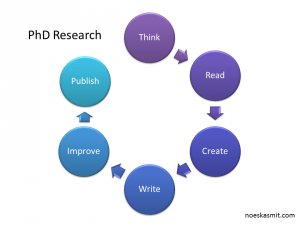This weekend one of the students that is working on a MSc-thesis project related to my project asked me: ‘What’s it like to be a PhD-student?’. While there is no clear-cut answer for this and this probably varies wildly between fields, countries and departments, I would still like to reflect on my own experiences in this post. I am now officially one year into my PhD (out of four here in the Netherlands) and this is what it’s been like so far:
Working it
So what do you do as a PhD-student? Research obviously, but what does this mean? It roughly works as follows: You start off with either cool idea or work from an existing problem. Once you’ve got a clearer vision of the approach to solve this, you search for what has been done already and read the existing relevant publications on the subject. If what you had in mind has been done already, it’s either back to the drawing board or thinking of suitable extensions to existing work. Now it’s time to formulate your contributions. What is it that your work will bring to the table that is novel and why is this interesting and useful? When you’ve ironed out these details, it’s time to start working it!

How exactly this happens will depend on your field, in the hard sciences it will be experiments for instance while in a field like computer science it’s typically implementing your ideas. Once you have results you need to publish them, so you start writing your scientific paper for either a conference or a journal. Once you submit this, scientific peers review your work and you get feedback from them along with the decision to accept or reject your work. Whatever the outcome, you will have received information to polish your work. Once published, the full cycle starts again from the beginning with a new topic: rinse and repeat! After a couple of these iterations, you write a thesis that either consists of your publications all wrapped up together in a nice package or something written from scratch. In the end you defend your PhD in front of a committee and then your life as a PhD-student is officially over.
So what are the everyday activities involved? For me it’s reading, implementing, writing, presenting, assisting in teaching, supervising students and drinking a lot of tea. The ratio of these varies based on the current phase of your research (the tea drinking is pretty much a constant though).
Benefits
So why would you be interested in doing a PhD? The obvious answer to this might seem to get a PhD-degree, but for me personally this was not at all my motivation. There are some benefits to a job like this that you’d be hard-pressed to find in other jobs:
- If you find a cool PhD-project you love, you will have the pleasure of working on this exclusively for four years. In a further academic career you’d also have to worry about funding and in a business setting you’d have to worry about profits.
- Financial stability: the luxury of a fixed contract for four years (in the Netherlands) is a clear benefit in this difficult economy.
- You get to meet many new and interesting people from different cultures and get to travel to international conferences and places you might never visit otherwise.
- While you may have obtained a master’s degree, the learning doesn’t have to stop. There are research schools that offer advanced courses on the topics you love and during the long and arduous journey, you’ll also learn a lot about yourself.
This concludes my short summary of PhD-life. Of course this is just my take on things and it does not necessarily represent the views of others. If you ask me what the main requirement is for doing a PhD is though, I would answer: ‘Endurance. In enduring, grow strong.’
I agree with the endurance part 🙂 (Also with the rest, but especially the endurance)